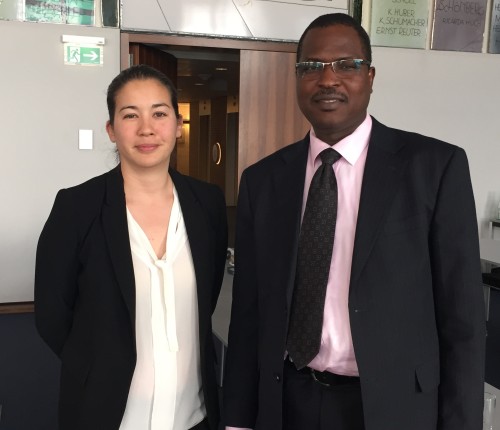Nigeria’s international climate diplomacy on Friday in Bonn, Germany received a boost when its representative, Mr Peter Tarfa, emerged vice-chair of the Adaptation Fund Board’s Project and Programme Review Committee (AFB-PPRC).

Under the new capacity, Tarfa, who is a deputy director in the Department of Climate Change (DCC) in the Federal Ministry of Environment, will be responsible for evaluating and recommending submitted project and programme proposals to the Board for approval.
“This is a critical position and an added feather for Nigeria in international climate diplomacy,” remarked a source close to the DCC. Nigeria is representing Africa under the dispensation.
Tarfa will work closely with the new chair, Ms. Yuka Greiler from Switzerland – representing Western European and other Groups. The pair were elected during the 25th Meeting of the AFB (AFB25) holding in Bonn.
Tarfa said: “The achievement is certainly for all of us in the climate change family. I could not have achieved this without everyone’s support.”
Regarding the preparation of the nation’s Intended Nationally Determined Contributions (INDC), he stated: “National efforts have started and we will soon host a national stakeholders’ meeting.”
The Adaptation Fund (AF) is a fund established under the Kyoto Protocol of the United Nations Framework Convention on Climate Change (UNFCCC) to finance concrete adaptation projects and programmes in eligible developing countries that are particularly vulnerable to impacts of climate change. Nigeria is eligible.
A concrete adaptation project/programme is a set of activities aimed at addressing the adverse impacts of and risks posed by climate change. The activities shall aim at producing visible and tangible results on the ground by reducing vulnerability and increasing the adaptive capacity of human and natural systems to respond to the impacts of climate change, including climate variability. Adaptation projects/programmes can be implemented at the community, national, regional and transboundary levels. Projects/programmes concern activities with a specific objectives and concrete outcomes and outputs that are measurable, monitorable, and verifiable.
At present, up to US$10 million per country can be granted for projects and programmes and over US$165 million has been approved to date. This implies that the sum of US$10 million is available for Nigeria at the AFB subject to designating a National Implementing Entity and approval of submitted concrete project or programme proposal either through a National Implementing Entity (NIE) or a Multi-lateral Implementing Entity (MIE).
For a country to access the Adaptation Fund, it must be a party to the Kyoto Protocol; must be a vulnerable developing country; must designate a National Authority that will endorse country submission; and must submit project or programme proposals through a National Implementing Entity (NIE) or Multi-lateral Implementing Entity (MIE) such as UNDP, World Bank, FAO.
The Adaptation Fund has a direct access modality, which means that an accredited national institution manages granted funds and has responsibility for project implementation, monitoring and evaluation. An accredited national institution is called a National Implementing Entity (NIE). The Bank of Industry (BoI) has been proposed as Nigeria’s NIE and its application is under consideration by the Fund’s Accreditation Panel.
To become a NIE, an institution must meet the fiduciary risk management standards set by the AFB and be endorsed by the country’s Designated Authority (DA). The DA in Nigeria is the Department of Climate Change, Federal Ministry of Environment. The fiduciary risk management standards cover three areas: financial management and integrity, institutional capacity and transparency and self-investigative powers
